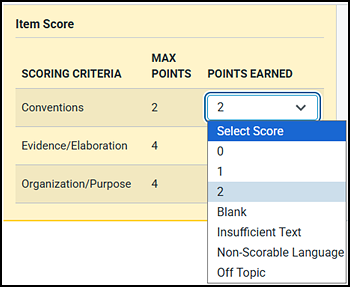Hand Scoring Condition Codes
Condition codes are used for student responses to short-answer and full-write items that cannot be scored because of the nature of the student’s response. They are available for the Smarter Balanced Interim Assessments only.
A detailed description of each available condition code is provided in table 1. A condition code may be selected instead of a numeric score from the Points Earned drop-down list (figure 1).

Figure 1. Points Earned drop-down list
When a student’s response or writing trait is assigned a condition code, it is equivalent to a score of zero. Note that an assigned condition code for the interim assessments will not be displayed in the student’s results in CERS and is only visible when assigned to the student response in the THSS.
For full-write responses to ELA performance tasks, the condition codes “off topic” and “off purpose” can be assigned. In most cases, when a full-write response receives a condition code, the code is assigned to all writing traits of the response. However, if the condition code for a response is “off purpose,” only the evidence/elaboration and organization/purpose writing traits are assigned “off purpose,” and the conventions writing trait is still scored. This conventions item score is included in the total ELA score and the writing claim score. The rule for “off-purpose” scoring of conventions is applied to ELA full-write performance tasks regardless of the writing purpose of the assigned task.
| Condition Code | Description |
|---|---|
|
Blank (B) |
Student did not enter a response. |
|
Insufficient Text (I) |
|
|
Nonscorable Language (L) |
|
|
Off Topic (T) |
For ELA Full Writes Only
Off-topic responses are, generally, substantial responses. |
|
Off Purpose (M) |
For ELA Full Writes Only
Off-purpose responses are, generally, developed responses (essays, poems, etc.) clearly not written to the designated purpose. If the condition code for a full-write essay is “off purpose,” only the evidence/elaboration and organization/purpose writing traits are assigned “off purpose,” and the conventions writing trait is still scored. |

